 Petzlover
Petzlover Chausie is originated from Egypt but Chartreux is originated from France. Both Chausie and Chartreux are of same weight. Both Chausie and Chartreux has almost same life span. Both Chausie and Chartreux has same litter size. Chausie requires Low Maintenance. But Chartreux requires Moderate Maintenance
Chausie is originated from Egypt but Chartreux is originated from France. Both Chausie and Chartreux are of same weight. Both Chausie and Chartreux has almost same life span. Both Chausie and Chartreux has same litter size. Chausie requires Low Maintenance. But Chartreux requires Moderate Maintenance
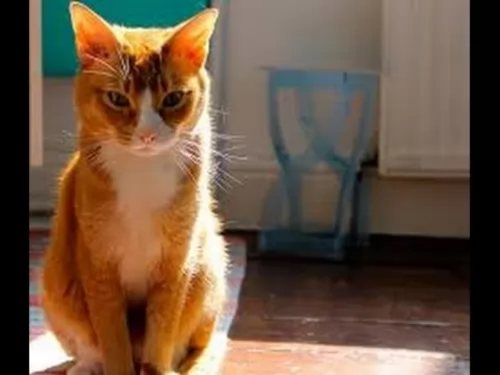 The Afro-Chausie came about from breeding a few individuals from a species of jungle cat which was native to India, Asia and the Middle East. In other words, this is a cross between a wild cat and a domesticated cat.
The Afro-Chausie came about from breeding a few individuals from a species of jungle cat which was native to India, Asia and the Middle East. In other words, this is a cross between a wild cat and a domesticated cat.
It was only in 1995 that the Chausie was recognized as a domestic breed, and by the International Cat Association.
The Chausie breed essentially began in the 1990s, when breeders name the breed Chausie and also developed a breeding program. They received registration status in 1995. Chausies are bred in North America and Europe and in 2003 became a new breed in the United States.
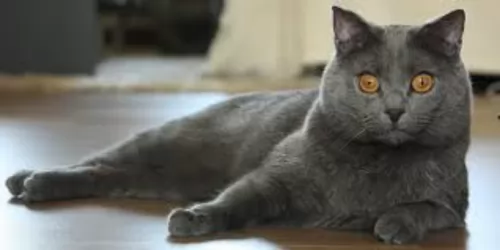 Hailing from France, the Chartreux cat is a rare cat breed but is still recognized by a number of cat registries around the world.
Hailing from France, the Chartreux cat is a rare cat breed but is still recognized by a number of cat registries around the world.
It’s not a new breed of cat, and in fact, the Chartreux is mentioned for the first time in 1558 in a poem and later on in paintings. There are quite a few legends as to the origins of the Chartreux and while some believe that the cats were brought to France by monks others believe that the Chartreux's ancestors were feral mountain cats from Syria.
European breeders kept the breed from extinction, especially after the 2nd world war, and the first Chartreux were brought to the United States in 1971. In 1987 the Cat Fancier’s Asociation advanced the Chartreux breed to championship status.
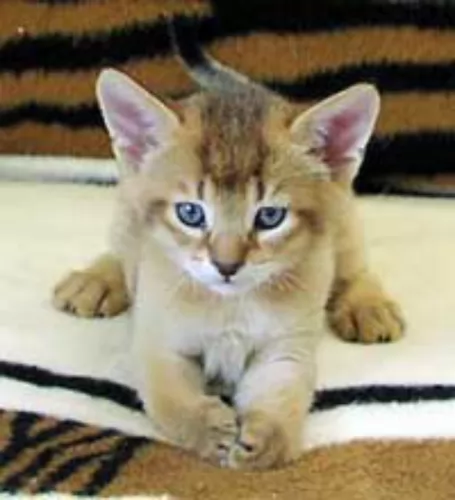 The Chausie is a medium to large cat with a long body and long legs. In fact, the hind legs are somewhat longer than their front legs, and they’re able to easily leap into the air and up onto high perches. Some people say these cats look like Pumas.
The Chausie is a medium to large cat with a long body and long legs. In fact, the hind legs are somewhat longer than their front legs, and they’re able to easily leap into the air and up onto high perches. Some people say these cats look like Pumas.
The adult Afro-Chausie can weigh between 5 to 9kg and they stand in height from 35cm to 45cm and sometimes taller, both male and female.
The ears of the cat are broad and tall and the almond-shaped eyes are a yellow to green shade. The TICA Chausie breed standard says that the cat comes in 3 colors – a black/brown ticked coats, solid black and black grizzled tabby, but in fact, they come in quite a few other colors and patterns too.
Your Afro-Chausie is an intelligent, loyal, social and athletic cat that is also playful. They love their human companions and will form a deep bond with them, making it difficult to rehome him later on.
They don’t like being alone, in fact to such an extent that they will befriend dogs in the home too. This is such an active cat and you can even train him to walk on a leash.
It’s a cat that also loves water and Similar to Bengals and Savannahs, this breed, too, enjoys water. This cat will form deep bonds with owners, hence rehoming has been known to be particularly challenging with this breed
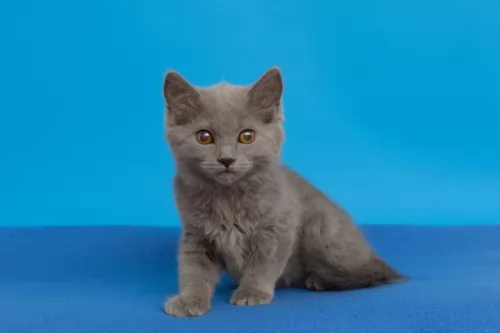 The Chartreux is a large, strong, stocky, muscular cat that can weigh anything between 4 to 7kg while some can weigh as much as 9kg.
The Chartreux is a large, strong, stocky, muscular cat that can weigh anything between 4 to 7kg while some can weigh as much as 9kg.
He has short legs when compared to the large body. He is known for his blue-like, silver-gray coat. In fact, the color can be any shade in the region of blue-grey. The coat is short, dense and double-coated and he has gold or copper-colored eyes.
People who have owned these cats say that they can take 3 to 4 years to reach maturity. Some people get mixed up and think this cat is very similar to the British Blue but they are two different breeds altogether.
The Chartreux is a real lap-cat just loving being able to settle down into his human owner's lap. It’s a cat with a 'smiling’ face because of the structure of his muzzle.
He is a very affectionate cat and will follow his people much like a dog. He is very intelligent and quiet and adapts well to a new situation. It's a cat that loves to climb so you will need to invest in a climbing tree for him as well as a scratching pole.
He is a good cat for first-time cat owners as well as being a good friend in homes with well brought up children. He is able to be friendly with other pets in the house.
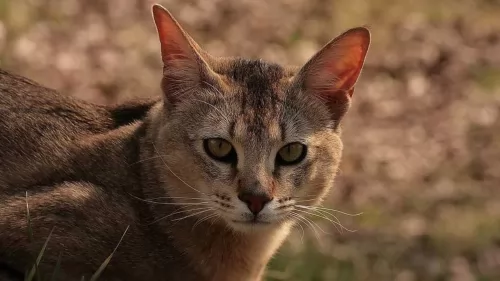 The Chausie loves human contact and they love games with their human family.
The Chausie loves human contact and they love games with their human family.
They’re intelligent and are constantly looking for things to do. They are athletic and have plenty of energy. They’re social, playful and make great playmates for children who have been taught to respect animals.
When you bring an Afro-Chausie into your home, you can expect to have a lot of action and entertainment with this beautiful cat.
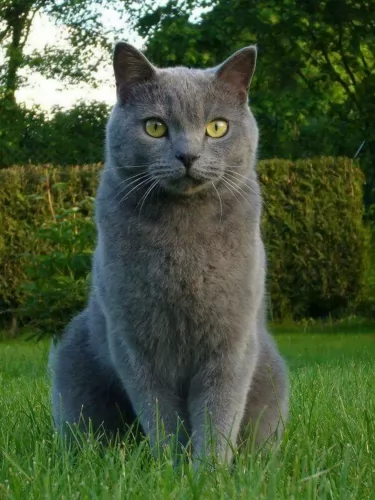 Although this is a large, strong cat, he is actually a gentle feline in nature and he doesn’t like being part of any bickering among his human family, preferring to run away. He also doesn’t like being spoken harshly to when he has done something wrong.
Although this is a large, strong cat, he is actually a gentle feline in nature and he doesn’t like being part of any bickering among his human family, preferring to run away. He also doesn’t like being spoken harshly to when he has done something wrong.
This cat isn’t an extrovert by any means but he isn’t particularly shy either and enjoys spending time with his human family.
He isn’t a demanding cat but is easy-going, just wanting to get on in life and he promises to make you a steady, loyal companion.
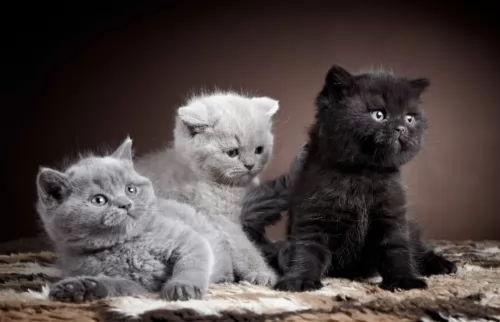 With good health, your Afro Chausie can live to be anything between 12 – 16 years of age. These cats are prone to developing food allergies, and this is why it is important to feed your Chausie high-quality food.
With good health, your Afro Chausie can live to be anything between 12 – 16 years of age. These cats are prone to developing food allergies, and this is why it is important to feed your Chausie high-quality food.
They’ve got fragile digestive systems and many are gluten intolerant.
All kinds of parasites can invade your Afro-Chausie’s body – internally and externally so be sure to have your Chausie checked over for parasites such as tick and fleas, worms and mites.
Check your Chausie for putting on too much weight as these cats have a huge appetite.
You just have to bear in mind that these cats can develop any of the illnesses that other domesticated cats get
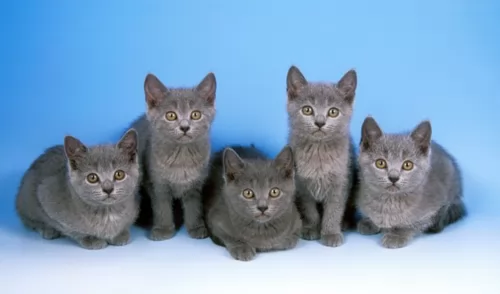 These cats are particularly prone to dental problems. The reason for this is that their incisors are closely set together and small.
These cats are particularly prone to dental problems. The reason for this is that their incisors are closely set together and small.
Because of the heaviness of this cat, the Chartreux is also prone to a disease known as patellar luxation or kneecap displacement. This problem can eventually lead to lameness. One way to avoid this particular problem is to rather get your kittens from reputable breeders.
These cats are much inclined towards weightiness so you have to be watching his diet carefully, more so because the cat is prone to patellar luxation.
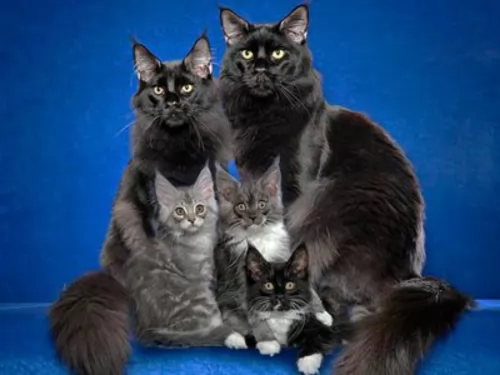 With their short coats, they only need to be brushed once a week as they are moderate shedders.
With their short coats, they only need to be brushed once a week as they are moderate shedders.
Provide your cat with a quiet place to sleep and which is comfortable and dry.
A cat tree can be useful for allowing your cat to climb and scratch.
Chausies are essentially meat-eaters. They don’t want to eat fruit and nuts. One of the Chausie’s ancestors was a wild cat and this is why they don’t eat the same foods as what your dog does.
Every cat thrives on a high-protein, low-carbohydrate diet. A dog’s diet with scraps from the table as well as human food can be fatal for your Chausie if it becomes your cat’s regular food.
He requires a diet of quality meat – beef, chicken, fish and organs – all foods that are easily digestible for your cat. Cats also need taurine from muscle meat such as shellfish and fish.
Always make sure your Chausie has access to a constant supply of fresh, cool water.
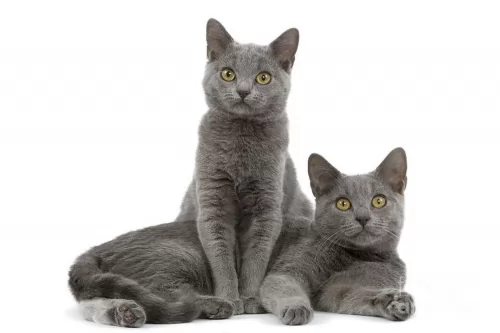 Your Chartreux cat’s dense, double coat will require brushing once or twice a week, especially in the cat’s seasonal shedding period.
Your Chartreux cat’s dense, double coat will require brushing once or twice a week, especially in the cat’s seasonal shedding period.
This cat doesn't take well to changes in his diet, particularly when he finds a type of food that he likes, then he wants to stick to that. You want to feed your cat a top-quality food to encourage good health but you want to avoid overfeeding as obesity in cats comes with lots of problems. A cat is a carnivore and you therefore need to feed your cat a diet rich in protein. Speak to your vet or another cat expert who can advise you on feeding your cat if you are in any kind of doubt. Make sure your kitty kat has a never-ending supply of fresh, cool water.
Always make a point of checking inside your cat's ears as well as inside his mouth for bad teeth. Bad teeth can cause terrible pain and your pet has no way of communicating this to you.
Have your cat neutered or spayed if you don't want your cat to have kittens.